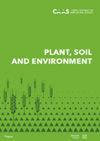Exogenous glucose modulated the diversity of soil nitrogen-related bacteria and promoted the nitrogen absorption and utilisation of peanut
IF 1.8
3区 农林科学
Q1 AGRONOMY
引用次数: 0
Abstract
Exogenous carbon (C) not only regulates plant growth but also provides energy for microbes and improves the soil environment. We hypothesised that exogenous C could improve plant growth by affecting the soil environment. Therefore, pot experiments were conducted and peanut cvs. Huayu 22(H) and NN-1(B) were used under three different treatments (the control, single nitrogen (N), and N combined with glucose (CN)). The results showed that the abundance and diversity of N-fixing bacteria are obviously influenced by the C and N, and exogenous C can promote the restoration of microbial diversity. The relative abundances of Burkholderiales were increased under HCN and BCN to 9.8% and 9.5%, respectively, compared to the control (3.9%, 2.5%). The abundance of N fixation bacteria increased mainly due to the soil nutrient change. In comparison with the single N treatment, the addition of the C significantly decreased the soil NH4+-N and NO3–-N contents by 31.0% and 13.3%, respectively. And the activities of soil urease and nitrogenase were significantly increased. Compared to the control, single N significantly limited the root development, while the addition of C played a promoting role in root growth. Plant N accumulation increased compared with the control, but there was no significant difference between N treatment and CN treatment. These results indicated that exogenous C promoted soil microorganism activity and strengthened plant growth by changing the soil environment.外源葡萄糖调节了土壤氮相关细菌的多样性,促进了花生对氮的吸收和利用
外源碳(C)不仅可以调节植物生长,还可以为微生物提供能量,改善土壤环境。我们假设外源C可以通过影响土壤环境来促进植物生长。因此,对花生进行盆栽试验。花育22号(H)和NN-1(B)分别在对照、单施氮(N)和氮与葡萄糖(CN) 3种不同处理下处理。结果表明,固氮细菌的丰度和多样性明显受C和N的影响,外源C可以促进微生物多样性的恢复。HCN和BCN处理下Burkholderiales的相对丰度分别比对照(3.9%、2.5%)提高了9.8%和9.5%。固氮细菌丰度的增加主要是由于土壤养分的变化。与单施氮处理相比,施C显著降低了土壤NH4+-N和NO3——N含量,分别降低了31.0%和13.3%。土壤脲酶和氮酶活性显著提高。与对照相比,单施氮显著限制了根系发育,而添加C对根系生长有促进作用。与对照相比,植株氮素积累量增加,但氮素处理与CN处理间差异不显著。上述结果表明,外源C通过改变土壤环境,促进了土壤微生物活性,促进了植物生长。
本文章由计算机程序翻译,如有差异,请以英文原文为准。
求助全文
约1分钟内获得全文
求助全文
来源期刊

Plant, Soil and Environment
Agronomy, Soil Science-农艺学
CiteScore
4.80
自引率
4.20%
发文量
61
审稿时长
2.4 months
期刊介绍:
Experimental biology, agronomy, natural resources, and the environment; plant development, growth and productivity, breeding and seed production, growing of crops and their quality, soil care, conservation and productivity; agriculture and environment interactions from the perspective of sustainable development. Articles are published in English.
 求助内容:
求助内容: 应助结果提醒方式:
应助结果提醒方式:


